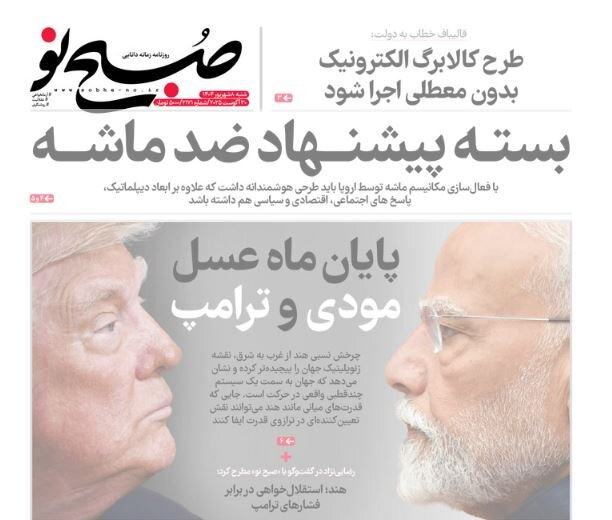Narrow window of diplomacy

TEHRAN - Sobh-e-No reviewed the seventh round of negotiations between Iran and the European troika (Britain, Frace and Germany) that ended in failure.
It wrote: The seventh round of negotiations between Iran and the European troika ended without a result. In the negotiations, Europe—acting as a proxy for Israel and the United States—sought to secure outcomes that had eluded them during the 12-day war in June, using the mechanism of snapback as leverage at the negotiating table. Iran has prepared itself for all scenarios, from ambiguous nuclear activity to using its regional power and influence to defend itself. From an economic point of view, the return of UN Security Council sanctions will not make much difference, because the United States has already applied all possible sanctions. However, the Iranian nuclear issue is an opportunity for Europe to get out of further isolation from global equations. In a situation in which Israel was desperately inciting the European troika to activate snapback mechanism and close diplomatic channels, Europe can, by avoiding dancing to the tune of Israel and the United States, prevent the escalation of tension by behaving as an independent actor and restore its position in global politics by managing the crisis.
Siasat-e-Rooz: The West seeking to blackmail Iran through snapback
Siasat-e-Rooz analyzed Europeans’ behavior now that they have written a letter to the UN Security Council to activate the snapback mechanism against Iran. The paper said: After announcing the snapback mechanism, the Europeans have been claiming that they embrace negotiations. If the West were really seeking negotiations, it would have done so during these years and would have fulfilled its obligations under the JCPOA instead of illegally activating the snapback mechanism. The results show that the West, imagining that the economic conditions are unstable, is seeking to blackmail Iran. The main point is that the West, having failed in the military confrontation, is seeking to make Iran surrender in the form of imposed diplomacy. The country's economic condition during the 12-day war showed that Iran has overcome difficult conditions resulting from sanctions and simply needs internal convergence and proper management. Meanwhile, reactions to Trump's tariffs have shown that the value of the dollar has lost its essence and that sanctions can be neutralized through closer interactions with neighbors, and blocs such as BRICS and Shanghai.
Jam-e-Jam: Tools that do not work against Iran
In an interview with Dr. Mohammad Marandi, an international affairs analyst, Jam-e-Jam discussed the issue of snapback and the importance of Iran's relations with countries such as China and Russia. Marandi said: Maximum pressure sanctions, after the activation of snapback, include all the cases that are currently in force. Russia and China's rejection of this process serves our interests and highlights that, had efforts to undermine Iran's relations with these countries succeeded, our situation would have been significantly more challenging. The foreign policy of the Islamic Republic of Iran has acted rationally and has always tried to have good relations with all countries in the world, including China and Russia. We even accepted indirect negotiations on our own terms, but after the attack on Iran, it became clear to everyone that the West does not have good intentions and cannot be trusted. The Islamic Republic has acted authoritatively and intelligently, and at the same time intends to strengthen its relations with countries member to BRICS and Shanghai Cooperation Organization. Therefore, the Western threat tool is rapidly losing its steam.
Kayhan: Iran’s strategy today is reciprocity, not passivity
In a commentary, Kayhan wrote that Iran has adopted a reciprocal approach toward the West. It said the point is that the West does not understand the language of logic and negotiation. What is important in the face of Western blackmail is the language of power and reciprocal threats. The best and most decisive response to the snapback mechanism is to withdraw from the NPT. This action not only sends a clear message to the West but also shows that Iran is no longer submit to oppressive and unilateral approaches. The West is not afraid of Iran’s uranium enrichment and centrifuges, but of Iran’s independence, progress, and empowerment under conditions of sanctions and pressure. Accordingly, the snapback mechanism, the JCPOA, sanctions, and diplomatic pressure are all a cover for the same main goal: to contain and stop a model called the Islamic Republic. By activating the snapback mechanism, Europe showed that the JCPOA was nothing but a trap for Iran. Now, by withdrawing from the NPT, the Islamic Republic will show that it is no longer willing to accept these ridiculous shows. This decision is not only a response to the arrogance of Europe and America, but also a clear message from the Iranian nation: dignity, independence, and national rights are not negotiable.
Leave a Comment